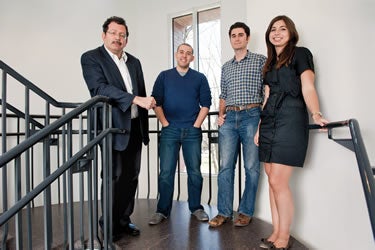Students spearhead a project proposing constitutional reforms for Bahrain
This winter, as protests erupted throughout the Middle East, Jason Gelbort ’12 was one of the many obsessively watching the news, wondering if there was anything he could do to help. Then, on March 2, he went to a talk by Chibli Mallat, the Custodian of the Two Holy Mosques Visiting Professor of Islamic Legal Studies at HLS.
“It was nice to do something that can have an impact on the real world while you’re in school. “
Jason Gelbort ’12
Mallat mentioned that he wanted to undertake a project on constitutional reform in Bahrain, which in recent weeks had been engulfed by pro-democracy demonstrations. (Mallat had been approached by opposition leaders in Bahrain and contacts in the U.S. State Department, who thought that a document outlining some possible constitutional reforms could be helpful on the ground.) Gelbort, co-president of the Harvard Law & International Development Society (LIDS), had worked the previous summer for the Public International Law & Policy Group, trying to help build a new constitution in Nepal. He volunteered to help Mallat conceptualize and organize the project, soliciting a number of students from LIDS. The two recruited Mostafa Abdelkarim ’11, who, with other students, had just helped Mallat with proposed reforms to Egypt’s Constitution. They also reached out to Anjali Mohan ’12 and about two dozen students from the Kennedy School and the Fletcher School of Law and Diplomacy, among other schools. For six days the group researched and drafted options for constitutional reform of Bahrain’s repressive monarchy, along with seven background papers on topics such as the process of constitutional change and examples of transition.
Gelbort served as editor and project manager, and he and Mallat co-wrote an essay highlighting their recommendations for proposed amendments to the current constitution, including the following reforms: establishing a democratically accountable executive role for the prime minister, balancing the powers of the prime minister and the king, increasing democratic accountability through the legislature, and ensuring judicial independence.
From Mallat’s perspective, he and the students together accomplished work that he never could have on his own. “It was wonderful. They took the idea and ran with it. … It was a process I don’t think I could have done anywhere else in the world,” Mallat says.
The group sent the documents to Mallat’s contacts and had them translated into Arabic, in the hopes that they could be published in Bahrain’s lone independent newspaper, Al Wasat. But days later, the Bahraini government cracked down, bringing in troops from Saudi Arabia to help stamp out the protests, and cutting off any chance of immediate change. (As part of the crackdown, the government took over Al Wasat.)
Gelbort stresses that the project was intended to inform a compromise and offer an entry point for dialogue. “We have to realize that we’re outsiders and that these will be decisions made by people there,” he says. He still hopes that their work will someday be disseminated in Bahrain. For now, they have published their recommendations in the Virginia Journal of International Law Online and posted their background papers on Mallat’s website, Right to Nonviolence. “It was nice to do something that can have an impact on the real world while you’re in school. That’s something we were all hoping for,” says Gelbort, “and are still hoping for.”
